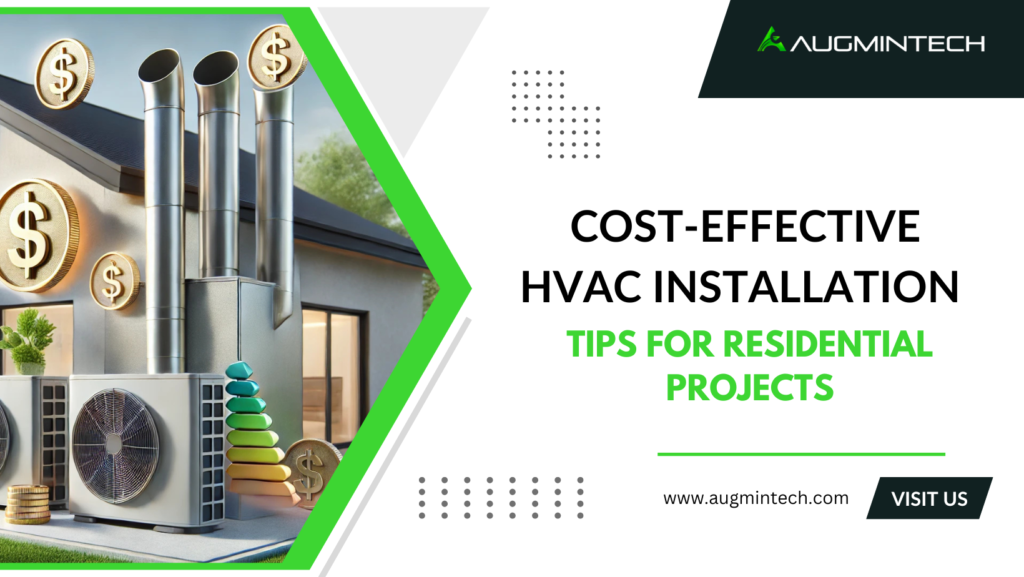Cost-Effective HVAC Installation Tips for Residential Projects
- December 8, 2024
- 5:05 pm
- 1300+ Comments

Introduction: Maximizing Efficiency in HVAC Installations
When it comes to residential projects, HVAC systems are an essential component for ensuring comfort and air quality. However, the cost of installation can be significant if not planned correctly. This guide provides practical, cost-effective tips to help homeowners and contractors streamline HVAC installations without compromising on performance or quality.
Table of Contents
Key Subtopics Covered:
- Why cost-effective HVAC installation matters
- Factors influencing HVAC installation costs
- Real-life hacks for saving money on HVAC systems
- Interview tips for discussing HVAC costs and solutions
Why Cost-Effective HVAC Installation Matters
HVAC systems represent a significant investment in residential projects. A well-installed and efficient system not only reduces initial expenses but also minimizes long-term energy costs, ensuring a higher return on investment (ROI).
Key Benefits of Cost-Effective HVAC Installations:
- Energy Savings: Optimized systems consume less energy, reducing utility bills.
- Longevity: Proper installation prevents wear and tear, extending system lifespan.
- Environmental Impact: Efficient systems reduce carbon footprints.
Factors Influencing HVAC Installation Costs
Before diving into cost-saving tips, it’s essential to understand the factors affecting HVAC installation expenses:
- System Size: Oversized or undersized systems can lead to inefficiencies and higher costs.
- Type of HVAC System: Centralized systems are costlier than split or ductless options.
- Ductwork Requirements: Installing new ductwork or modifying existing systems can add to expenses.
- Installation Complexity: Projects with tight spaces or challenging layouts often incur additional costs.
- Energy Efficiency Ratings: High-efficiency units may have higher upfront costs but offer savings over time.
Real-Life Hacks for Cost-Effective HVAC Installation
1. Conduct a Thorough Load Calculation:
Avoid over-sizing or under-sizing the system by performing an accurate Manual J load calculation. This ensures the system is tailored to the home’s heating and cooling needs.
2. Choose the Right System:
- For smaller homes, consider ductless mini-splits to save on ductwork costs.
- For larger homes, invest in zoned systems for better efficiency and control.
3. Plan During Construction or Renovation:
Installing HVAC systems during construction minimizes labor costs and structural modifications.
4. Use Energy-Efficient Models:
While high-efficiency models have a higher initial cost, rebates, and long-term energy savings often offset the investment.
5. Optimize Ductwork Design:
Seal and insulate ducts to prevent energy loss and improve airflow. Opt for a simple layout to reduce material costs.
6. Leverage Smart Technology:
Install programmable thermostats and smart sensors to maximize efficiency and control heating and cooling schedules.
7. Negotiate with Contractors:
Obtain multiple quotes and negotiate to find a reliable contractor within your budget. Ensure the contractor is licensed and experienced.
8. Utilize Rebates and Tax Credits:
Research local, state, or federal incentives for installing energy-efficient HVAC systems.
FAQ's (Frequently Asked Questions)
Consult an HVAC professional to perform a Manual J calculation, which considers factors like square footage, insulation, and local climate.
Ductless mini-split systems are often the most cost-effective for smaller spaces, requiring minimal installation and offering high efficiency.
Yes, while the upfront cost is higher, energy savings and potential rebates make them a cost-effective choice in the long run.
Regular maintenance, sealing duct leaks, and upgrading to a programmable thermostat can significantly reduce energy expenses.
Conclusion: Invest Smart for Long-Term Savings
Cost-effective HVAC installations require careful planning, the right choice of systems, and a focus on efficiency. By implementing the tips outlined above, homeowners can ensure a comfortable, energy-efficient living space while staying within budget.
Real-Life Hack: Ask These Questions During Contractor Interviews
- “Can you provide a detailed load calculation for my home?”
- “What energy-efficient options do you recommend for my budget?”
- “Are there any local rebates or incentives we can leverage?”
- “How do you ensure proper duct sealing and insulation?”
Take the Next Step in Your HVAC Career
Ready to Excel in HVAC Design and Drafting? Our HVAC Design & Drafting Course provides the hands-on skills and industry knowledge you need to secure high-paying roles and advance in the field. From in-depth system design to real-world troubleshooting, our course has it all.
